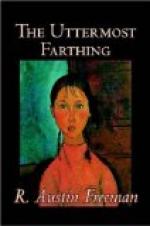“Hence it was that my unrest led me almost daily to perambulate that strange region east of Aldgate where uncouth foreign names stare out from the shop signs and almost every public or private notice is in the Hebrew character. Dressed in my shabbiest clothes, I trudged, hour after hour and day after day, through the gray and joyless streets and alleys, looking earnestly into the beady eyes and broad faces of the East-European wayfarers and wondering whether any of them was the man I sought.
“One evening, as I was returning homeward through the district that lies at the rear of Middlesex Street, my attention was arrested by a large card tacked on the door of a closed shop. A dingy barber’s pole gave a clue to the nature of the industry formerly carried on, and the card—which was written upon in fair and even scholarly Hebrew characters—supplied particulars. I had stopped to read the inscription, faintly amused at the incongruity between the recondite Oriental lettering and the matter-of-fact references to ‘eligible premises’ and ‘fixtures and goodwill,’ when the door opened and two men came out. One was a typical English Jew, smart, chubby and prosperous; the other was evidently a foreigner.
“Both men stood aside to enable me to continue my reading, and, as I was about to turn away, the smarter of the two addressed me.
“’Good chanth here, misther. Nithe little bithness going for nothing. No charge for goodwill or fixtures. Ready-made bithneth and nothing to pay but rent.’
“‘Ja!’ the other man broke in, ’dat shop is a leedle goldmine; und you buys ‘im for noding.’
“It was an absurd situation. I was beginning smilingly to shake my head when the Jew resumed eagerly:
“I tell you, misther, itth a chanth in a million. A firth clath bithneth and not a brown to pay for the goodwill. Come in and have a look round,’ he added persuasively.
“I suppose I am curious by nature. At any rate, I am sure it was nothing but idle curiosity to see what the interior of a Whitechapel house was like that led me to follow the two men into the dark and musty-smelling shop. But hardly had my eyes lighted on the frowsy fixtures and appurtenances of the trade when there flashed into my mind a really luminous idea.
“‘Why did the last man leave?’ I asked.
“The Jew caught the lapel of my coat and exclaimed impressively:
“’The lath man wath a fool. Got himself mixthed up with the crookth. Thet up a roulette table in the thellar and let ’em come and gamble away their thwag. Thtoopid thing to do, though, mind you, he did a rare good line while it lathted. Got the sthuff for nothing, you thee.’ His tone at this point was regretfully sympathetic.
“‘What happened in the end?’ I asked.
“‘The copperth dropped on him. Thomebody gave him away.’
“‘Some of the ladies, perhaps,’ I suggested.
“‘Ach! Zo!’ the other man burst in fiercely, ’Of gourse it vas der vimmen! It is always der vimmen. Dese dam vimmen, dey makes all der drabble!’ He thumped the table with his fist, and then, catching the Hebrew’s eye, suddenly subsided into silence.




